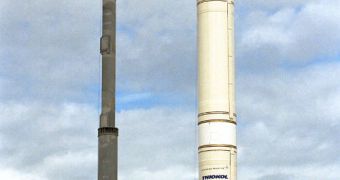Officials at the American space agency announced Thursday, September 18, that they have selected two more companies as part of the Launch Services II contract.
The Athena Launch Vehicle Family, which is developed by Lockheed Martin and Alliant Techsystems (ATK), will become a part of NASA's plans to fill in the gaps in its medium-launch-weight capability range.
The agency was looking for rockets capable of very specific performances, including the capability to place a 250-kilogram (550-pound) spacecraft in a low-Earth orbit (LEO).
The delivery system should also be capable of inserting the spacecraft into an orbit situated at 200 kilometers above the surface of the Earth, and at an inclination of 28.5 degrees.
The Athena rocket family met all these minimum requirements, and the expertise Lockheed and ATK have in the space industry made them natural choices.
ATK has been working with NASA for many years, developing and testing rocket engines and solid rocket boosters at various facilities around the United States.
The latest project on which the agency and ATK collaborated was the DM-2, a rocket engine that was supposed to power the ARES I rocket, a member of Project Constellation. The rocket is now canceled.
The Athena rocket family is very potent in its own way. Though it lacks the ability to carry impressively large cargo to space, it can deliver payloads of up to 1,800 kilograms, or roughly 3,970 pounds, to LEO.
The average payload fairing has a diameter of 92 inches, providing a transportation volume that can easily accommodate a large variety of satellites, as well as smaller Moon-bound missions.
Under the new contract, NASA wants to get Athena rockets that it can launch from facilities across the country, such as the Cape Canaveral Air Force Station (CCAFS), in Florida, or the Kodiak Launch Complex, in Alaska.
“We are pleased to be able to make Athena available for important NASA missions,” explains said John Karas, who is the vice president and general manager of the Human Space Flight division at Lockheed Martin Space Systems Company.
“Athena combines both companies’ heritage and expertise in launch systems, and makes key system upgrades to provide enhanced product and performance capabilities to meet NASA’s needs,” the officials goes on to say.
“As the newest addition to NASA’s cadre of launch vehicles, Athena offers low-risk, reliable launch services at an affordable price,” concludes the vice president and general manager of the Strategic and Commercial Systems division at ATK, Scott Lehr.

 14 DAY TRIAL //
14 DAY TRIAL //